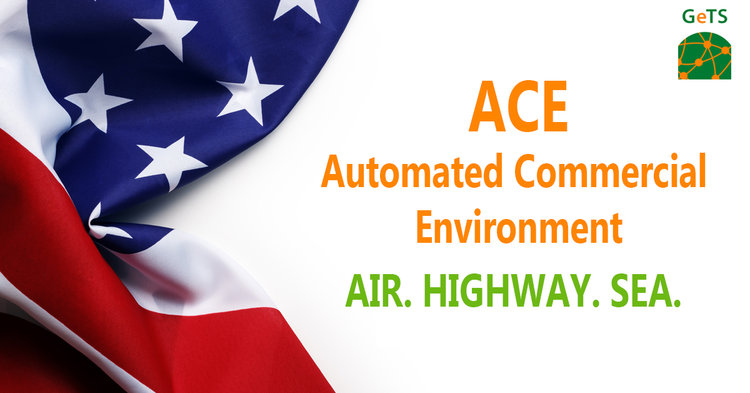Table of Contents:
Job Scam Alert:
This is to notify you that we have been alerted of job scams misusing the name of Global eTrade Services (GeTS). We would like to emphasize that there is no active, ongoing recruitment under the brand name of GeTS as we now operate under our parent company, CrimsonLogic. Please read the full disclaimer here.
- 14 Feb 2019
- USA
- #Section 321
- #USA
- #ACE
- #ACE eManifest
- #US eManifest
- #USA eManifest
- #Automated Commercial Environment
- #Trade
- #United States Customs and Border Protection

Starting January 1, 2019, carriers are required by U.S. Customs and Border Protection (CBP) to file advanced eManifests for Section 321 shipments containing items valued at $800 or less. Section 321 shipments enter the U.S. duty- and tax-free. The carrier or trucker is responsible for filing electronic manifests, not the broker, even if the carrier relies on a U.S. or Mexican customs broker to process their paperwork.
A technical problem with the Automated Commercial Environment (ACE) late last year limited eManifest filing for Section 321 merchandise to cargo of 5,000 or less when transported by truck. CBP did not impose penalties until the glitch was fixed, but carriers with 5,000 shipments or less that were filing eManifests manually were still at risk of being fined. Fines start at $5,000 for the first offense and can reach up to $10,000 for subsequent offenses.
IMPACT OF NEW CBP PENALTIES FOR CROSS-BORDER TRUCKS
In 2017, government data showed that inbound cross-border trucks from Mexico increased 4 percent to 6.04 million. The majority of cross-border cargo on the southern border is short-haul and within the commercial zone. Trailers are moved to the border in Mexican trucks and transferred to a U.S.-based carrier. For small trucking companies operating on the southern border, heavy penalties can mean a week’s lost income or more. Heavy fines could also put them out of business. With fewer carriers and trucks on the road, importers may experience higher transport costs and other fees for cross-border shipments.
CBP Regulation for Section 321 Shipments

Section 321 is a release option for shipments valued at $800 or less. It is an informal entry type designed to facilitate the clearance of low-value and e-commerce shipments. Like other informal entries, Section 321 shipments do not require a customs bond and are free of tax and duty. Section 321 shipments covers eligible personal and commercial cargo, except for goods under quota and certain regulated goods:
-
Goods requiring inspection before release, regardless of value
-
Goods subject to Anti-Dumping / Countervailing duty (ADD/CVD)
-
Goods regulated by the FDA, Food Safety Inspection Service (FSIS), National Highway Transport and Safety Administration (NHTSA), Consumer Product Safety Commission (CPSA), and United States Department of Agriculture (USDA).
In July 2017, the FDA exemption list included cosmetics, dinnerware, radiation-emitting non-medical devices, biological samples for laboratory testing and food (excluding ackees, puffer fish, raw clams, raw oysters, raw mussels, and foods packed in airtight containers stored at room temperature) as eligible for Section 321 release.
On March 10, 2016, the de minimis value of duty- and tax-free cargo was raised from $200 to $800 to accommodate e-commerce shipments and make it faster and cheaper for CBP to clear imports. To be eligible as a Section 321 shipment, merchandise must not exceed $800 in value, must not be split among several lots under a single order or contract, and must be imported into the U.S. by one person per day. CBP may refuse to clear a Section 321 shipment if the shipment is deemed high risk for a particular type of merchandise or class.
New Section 321 Requirement
From January 1, 2019, commercial trucks transporting Section 321 goods will be required to file an advance eManifest. Before that, Section 321 shipments were exempt from the eManifest rule by CBP. However, the surge in e-commerce activity in the past few years and the increased de minimis value ($200 to $800) have caused a rise in shipments that are filed as Section 321. According to CBP, the lack of eManifests for Section 321 shipments does not allow them to conduct risk assessment or advanced targeting, which leads to slower processing times.
The new Section 321 rule was implemented in phases, starting on November 26, 2018. Now, carriers that fail to comply with the eManifest rule will receive a monetary penalty of $5,000 for the first offense and $10,000 for subsequent offenses. The enforcement of eManifests for Section 321 shipments is shown in CBP’s Cargo Systems Messaging Service #18-000656.
CBP FILING FOR CROSS-BORDER TRUCKS

Carriers or their authorized agents must submit the Section 321 eManifest to CBP via ACE before the truck arrives at the first point of entry. The advance eManifest rule ensures shipments and trip details are known to customs officials before the shipment actually arrives.
There are multiple ways to file a Section 321 advance eManifest: ACE Portal, EDI (electronic data interchange) or a third party services (software, EDI connectivity and direct filing). To report a Section 321 shipment, carriers must use the shipment type “Section 321” and include the information on their ACE eManifest.
Section 321 data requirements include the country of origin of the merchandise, shipper and consignee name, address and country, detailed description of the goods (include a statement that identifies the shipment as Section 321 and a precise commodity description), quantity, shipping weight, and value (may be zero, but less than or equal to $800).
Importers that process large volumes of Section 321 shipments cannot consolidate the goods into one shipment, as the total value will exceed the limit of $800. Each shipment must be manifested separately with unique shipment control numbers (SNC). Section 321 shipments also require a consignee name and address; courier service or postal office addresses are not allowed.
The carrier must provide other information needed for ACE shipments. However, the carrier will not receive an entry number for the informal shipment type. At the border, the driver must present the ACE lead sheet and supporting paperwork for the Section 321 shipment to the customs officer when requested.
Note that eManifest filing via the ACE Portal is for low-volume filing only. EDI transmission or third party software is the standard for high-volume shipments, as this allows filers to create and submit multiple eManifests at the same time.
EDI eManifest Transmission
EDI is a system-to-system connection that allows filers to exchange information with CBP and other government agencies using standardized messaging formats. EDI is recommended for high-volume users. However, setting up an in-house EDI system can be very expensive. A popular alternative is external EDI/software services offered by third party providers. CBP has a list of approved providers that have completed systems testing with their IT department.
GETS SOLUTION TO NEW CBP PENALTIES FOR CROSS-BORDER TRUCKS
Compliance with the Section 321 advance eManifest rule is easier when you have the right technology partner. Global eTrade Services (GeTS) is a CBP-approved provider of advanced eManifest solutions and trade facilitation software. The software-as-a-service (SaaS) model allows carriers to subscribe to plans on the fly, choose the best and most cost-effective plan for their needs and not worry about setup and IT expenses.
GeTS ACE eManifest Highway is available as a standalone web application for easy, on-the-go filing or integrated with existing systems for seamless data sharing. GeTS ACE eManifest greatly reduces manual data entry, errors and paperwork. Carriers can quickly upload Section 321 shipments into the portal.
GeTS also provides an eManifest filing service to support businesses during holidays and busy times. Simply fax or email the paperwork to us, and our team will file the eManifest to CBP on your behalf. Status notifications and other important messages can be viewed in your Portal account or desktop/mobile device. GeTS processes thousands of eManifests monthly for businesses of all sizes.
